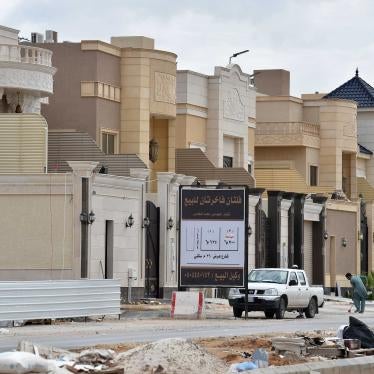(Beirut) – Bulgarian authorities should immediately suspend any plans to deport a Saudi human rights activist to Saudi Arabia, Human Rights Watch said today. He would be at serious risk of arbitrary detention, torture, and an unfair trial if he is sent back there.
Abdulrahman al-Khalidi has been a human rights activist for more than a decade, advocating for the rights of prisoners in Saudi Arabia and countering the government’s digital propaganda, including their online troll armies. Al-Khalidi initially fled Saudi Arabia in 2013, fearing for his safety due to his activism. In October 2021, he crossed by foot into Bulgaria to claim asylum after living in exile for nearly a decade. On February 7, 2024, the Bulgarian National Security Agency issued al-Khalidi a deportation order, placing him at imminent risk of deportation.
“Abdulrahman al-Khalidi has spent more than a decade defending human rights at great personal risk, but he now faces a serious threat of detention and torture if Bulgarian authorities deport him to Saudi Arabia,” said Joey Shea, Saudi Arabia researcher at Human Rights Watch. “Despite the massive whitewashing efforts by Mohammed bin Salman, the de facto Saudi ruler, Saudi Arabia’s human rights record remains abysmal, and al-Khalidi is in grave danger of arbitrary detention and torture if forcibly returned.”
From 2011 to 2013, al-Khalidi was living in Saudi Arabia and advocating for the rights of prisoners in the country as part of the Saudi Civil and Political Rights Assocation, also known as “HASM.” He participated in multiple demonstrations in support of Saudi detainees in Riyadh. In March 2013, al-Khalidi fled Saudi Arabia out of concern for his safety, first to Egypt, then Qatar, and finally Turkey.
In exile, he continued his activism and worked as an opposition journalist for seven years, writing articles critical of the Saudi government. He was also active in an online Saudi movement established by the late journalist Jamal Khashoggi called the Bees Army, which sought to counter pro-Saudi government propaganda campaigns and online troll armies.
In the aftermath of Khashoggi’s murder in the Saudi Consulate in Istanbul, al-Khalidi feared for his safety and did not renew his identity documents, which may have required him to appear in the same consulate where Khashoggi was murdered. On October 23, 2021, he fled yet again and crossed into Bulgaria to claim asylum, where he now faces imminent deportation.
Given the rampant torture and due process violations in Saudi Arabia’s criminal justice system, Bulgaria would violate the principle of nonrefoulement by deporting a highly visible critic of the Saudi government at risk of being persecuted for his political opinions or being tortured.
Social media posts reviewed by Human Rights Watch show that al-Khalidi has been subject to a torrent of abuse from Saudi government-linked influencers. One such post called al-Khalidi a “traitor” and accused him of “treachery” as well as conspiring to “seek to destroy the homeland and sell it to the enemies.” Another threatened that “the coming months will be catastrophic.”
Human Rights Watch has repeatedly criticized rampant abuses in Saudi Arabia’s criminal justice system, including long periods of detention without charge or trial, denial of legal assistance, and the courts’ reliance on torture-tainted confessions as the sole basis of conviction. These violations of defendants’ rights are so fundamental and systemic that it is hard to reconcile Saudi Arabia’s criminal justice system with a system based on the basic principles of the rule of law and international human rights standards. Saudi Arabia applies its uncodified interpretation of Islamic law as its national law. In the absence of a written penal code or narrowly worded regulations, judges and prosecutors can convict people on a wide range of offenses under broad charges such as “breaking allegiance with the ruler” or “trying to distort the reputation of the kingdom.”
Deporting al-Khalidi may violate Bulgaria’s international obligations, including article 3 of the Convention against Torture and Other Cruel, Inhuman or Degrading Treatment or Punishment, which states that “no State Party shall expel, return (“refouler”) or extradite a person to another State where there are substantial grounds for believing that he would be in danger of being subjected to torture,” and article 33 of the Convention Relating to the Status of Refugees, which prohibits the “return of a refugee in any manner whatsoever to the frontiers or territories where his life or freedom would be threatened on account of his race, religion, nationality, membership of a particular social group or political opinion.” Bulgaria is a signatory to both conventions.
“Bulgaria should not forcibly return Abdulrahman al-Khalidi to Saudi Arabia, given the systematic torture, ill-treatment and due process violations in the Saudi criminal justice system,” Shea said.








